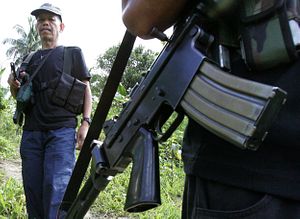On Friday, media reports indicated that the Philippine government and communist rebels were moving towards restarting formal negotiations, following a ceasefire to end one of Asia’s longest running insurgencies.
Those reports largely cited statements from Communist Party of the Philippines (CPP) founder Jose Maria Sison. Sison had revealed in an online podcast in the local Tagalog language uploaded on December 21 that the CPP had since September been in preliminary talks in the Netherlands with a special team from the Aquino administration to end the insurgency, and that negotiations could begin as early as mid-January 2015. Sison also detailed what the next steps might be in an interview with The Manila Standard published December 25.
If true, the move would be a positive step toward ending a Maoist rebellion waged by the New People’s Army (NPA) – the armed wing of the CPP – since 1969 which has claimed more than 40,000 lives. The Communist rebels, which reportedly number around 4,000 and are active in 69 of 81 Philippine provinces, are still considered by the government to be its most pressing internal security challenge. Philippine president Benigno Aquino has also said that he wants to end the insurgency before his term ends in 2016.
Yet even if talks do resume in 2015, there is no shortage of reasons to be skeptical that they will last or lead to a durable peace anytime soon. Philippine governments have been engaged in on-and-off negotiations with the CPP since the 1980s, and talks have repeatedly either fizzled out or faltered with finger-pointing on both sides. This time last year, the CPP was vowing to wait for Aquino’s successor to negotiate following floundering attempts to restart talks. Some dismiss the CPP’s current interest in talks as purely tactical following the arrest of two of its top leaders in March. Others are skeptical whether Sison, the CPP founder and the focus of recent news reports, actually controls the rebels on the ground.
Little wonder, then, that Teresita Dales, a presidential adviser on the peace process, cautiously noted on Friday that no formal meetings on the resumption of peace talks had occurred, even though both parties were amenable to returning to the table.
“I must state categorically that there have been no meetings between GPH (Government of the Philippines) and the NDF (the political wing of the CPP) to discuss the possible resumption of talks. It is true, however, that friends of the process have been shuttling between the two parties to explore possible parameters for restarting talks at the earliest time possible,” Deles said in a statement released by the presidential palace.
Deles said that while “feedback has been positive” on a possible resumption of talks, “there remain matters to be clarified in order to ensure that, if ever we do resume talks, it will not go the same way of an early, major impasse that has happened too often in the past.”
Even if sustainable talks can be arranged, those expecting a quick and comprehensive solution may be disappointed. Indeed, a CPP statement published on its website Friday clearly noted that “there should be no illusion” that talks would “lead to comprehensive agreements…as basis for a just and lasting peace.”
When Sison was asked whether the CPP was interested in reaching a final peace agreement with the Aquino administration along the lines of the government’s pact with the Moro Islamic Liberation Front (MILF) in the south, he bristled at the analogy, saying that they “were not like the MLF placing all hopes for a final peace agreement on the Aquino administration.” He suggested that a more realistic goal to aim for by the end of Aquino administration in June 2016 might be pacts on social and economic reforms and a ceasefire.
Given the outcome of past negotiation attempts, even those incremental gains would constitute progress.

































